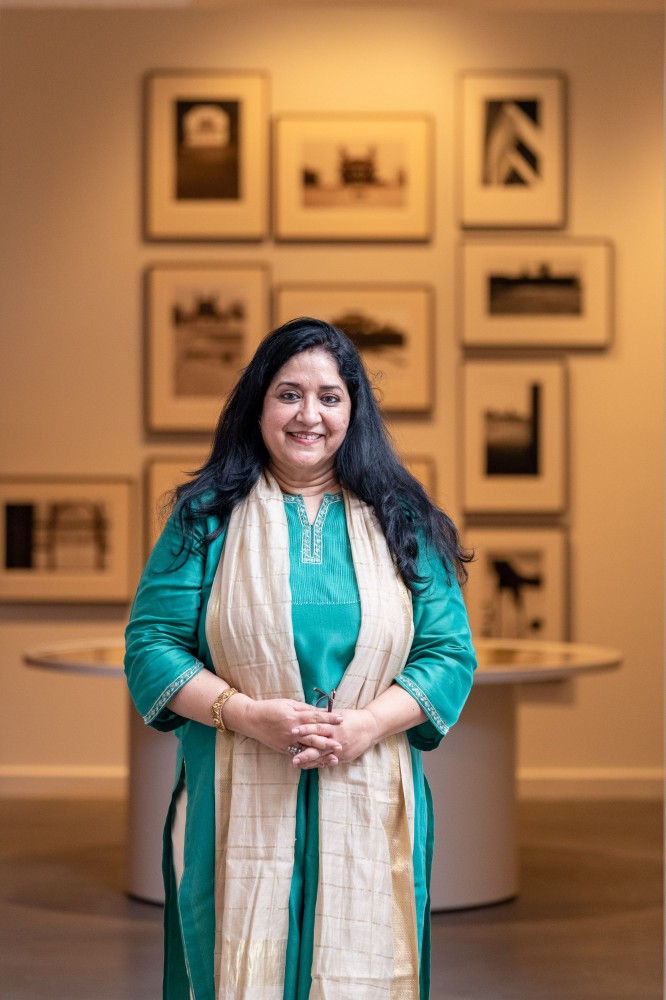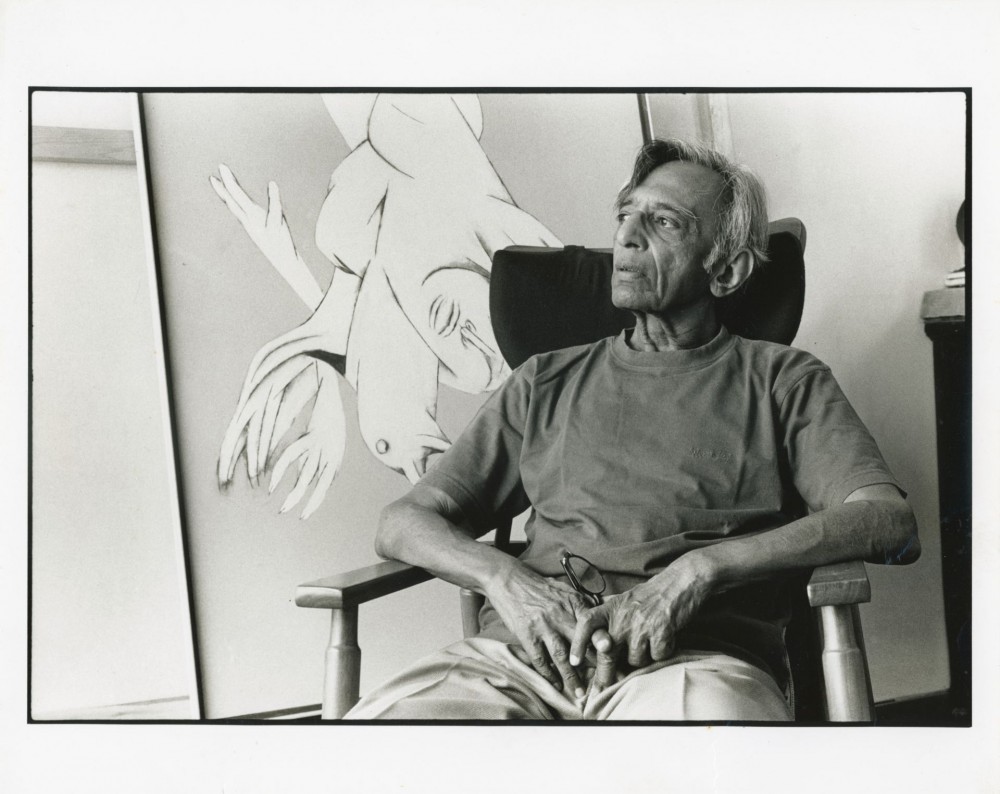
Tyeb Mehta, Falling Bird, 1999
Acrylic on canvas, 59 x 47 inch
Collection: Kiran Nadar Museum of Art
Copyright: Tyeb Mehta Foundation
Kiran Nadar Museum of Art (KNMA) with Tyeb Mehta Foundation and Saffronart Foundation, is pleased to present a major solo exhibition of Tyeb Mehta (1925–2009), titled TYEB MEHTA - Bearing Weight (with the lightness of being), to commemorate the birth centenary of one of India’s most iconic modernists. Opened on 13 November 2025 at Mahalaxmi Racecourse, Mumbai, as part of ART MUMBAI, the exhibition brings back to his home city some of Mehta’s most celebrated series alongside early drawings and paintings.
Conceived as a prelude to the forthcoming retrospective at the Kiran Nadar Museum of Art, New Delhi, curated by Roobina Karode (Director and Chief Curator, KNMA), the presentation offers rare insights into Mehta’s artistic legacy. Following its presentation at ART MUMBAI, the exhibition will remain on view at the Saffronart gallery, Mumbai from 18 November, until 30 November 2025. The retrospective is scheduled to open on 4 February, 2026 at the Kiran Nadar Museum of Art, New Delhi, coinciding with the India Art Fair 2026.

Tyeb Mehta, Bull, 1985
Bronze 28.3 x 20.9 x 20.9 inch
Collection: Kiran Nadar Museum of Art
Copyright: Tyeb Mehta Foundation
Born in 1925 in Kapadvanj, Gujarat, Tyeb Mehta's early exposure to image-making came through his family's involvement in the film business, which sparked his lifelong fascination with visual language. Initially drawn to art direction, he went on to study at the Sir JJ School of Art, Bombay (now Mumbai) in 1947, where he discovered the transformative potential of painting, a pursuit that defined his art practice. His association with the Progressive Artists' Group expanded his understanding of art and its potential in a newly independent India.
Over a period of seven decades, Mehta developed a visual vocabulary that reflected on the duality of humans and non-humans, their pain, conflict, and endurance, shaped by the social and political upheavals of his time, from the Partition of India on to the forbidding human condition. His protagonists, drawn from both mythical narratives and everyday life, inhabit stark, weightless spaces. Bulls, rickshaw pullers, birds, Mahishasura, Kali, and the Trojan Women are suspended between descent and transcendence, embodying the fragility and resilience of existence. It is unique how these recurring subjects for Mehta's work have offered possibilities to encapsulate events he witnessed all his life. In his hands, the bull transforms from an animal of burden into an icon — a symbol of colossal, restrained energy and the human condition caught between trauma and transcendence. The series Falling Figures bears the weight of memory and grief, reminding us of the fragility of survival.

Picture Credits KNMA
Roobina Karode, Director & Chief Curator, Kiran Nadar Museum of Art, said: “Tyeb Mehta's distinct modernist language emphasized a distilled approach towards the painted image and the world around him. His pictorial aesthetic transitioned from an agitated brushwork visible in his raw thick impasto to a flat, pristine, and restrained approach to colour and form. Despite being impacted by several conflicts and disquiet across the country, his art continued to embody a sublime/transcendent lightness and inward-looking presence. This exhibition is an attempt to reimagine the trajectories of Mehta's practice and his legacy. It also highlights KNMA's enduring commitment to furthering the narratives of modernism in India and South Asia.”
In the city of Bombay/Mumbai, that he embraced and lived till the end of his life, the exhibition brings together some of the most iconic works amplifying his recurrent subjects such as the Trussed Bull, Mahishasura, Falling Bird, Falling Man, Kali, and Diagonal, accompanied by drawings made at different junctures of his life. His quintessential solitary figure compressed between mass and lines exemplified a state between action and inaction, hope and despair, life and death.The exhibition speaks of Tyeb Mehta as a 'signal figure' who held space for humanity through his art and life.

Image Courtesy of Tyeb Mehta Foundation
About the artist
Tyeb Mehta was born in 1925 in Kapadvanj, Gujarat. He spent his formative years in the Crawford Market neighbourhood of Bombay. In 1944 he joined the Fazalbhoy Institute at St. Xavier’s College to study cinematography, later joining the Famous Cine Laboratory at Tardeo, Mumbai as Assistant Film Editor. He graduated in Fine Arts from Sir J.J. School of Art, Mumbai in 1952. During the same time, Mehta became associated with the Progressive Artists’ Group. He held his first solo exhibition in 1959 at Jahangir Art Gallery, Bombay after which he left for London, where he worked and lived till 1964. Thereafter, he visited New York on a Rockefeller Fellowship in 1968; the same year, he won a Gold Medal in painting at the first Triennial held in New Delhi. It was during this period that the diagonal emerged as a key pictorial element in his work and he started using large areas of colours to represent images. In 1970, he wrote and directed, Koodal for the Films Division, which won him the Filmfare Critics’ Award in 1970.
Some of his recent posthumous exhibitions are, Time Unfolded, Kiran Nadar Museum of Art (KNMA), New Delhi in 2011, Tyeb Mehta: Triumph of Vision, Vadehra Art Gallery, New Delhi in 2011, Crossings: Time Unfolded, Part 2, Kiran Nadar Museum of Art (KNMA), New Delhi in 2012, Modernist Art from India: Approaching Abstraction, Rubin Museum of Art, New York in 2012, Pioneers of Modernism, Sovereign FZE, Dubai in 2013; The Drawing Wall, presented by Vadehra Art Gallery at Lalit Kala Akademi, New Delhi in 2013; and Mnemonic: Partition-Partage, a Curator's Special Project at Venice Architecture Biennale, Venice in 2023. He was awarded Kalidas Samman by the Madhya Pradesh Government in 1988; Dayawati Modi Foundation Award for Art, Culture, and Education in 2005, and the Padma Bhushan in 2007 by the Government of India. His works are in major collections across the world, including Kiran Nadar Museum of Art, India, Peabody Essex Museum (PEM) in Salem, Massachusetts, Glenbarra Art Museum, Japan, National Gallery of Modern Art, New Delhi, Lalit Kala Akademi, New Delhi, and Bharat Bhavan, Bhopal. Tyeb Mehta passed away in 2009 in Mumbai.

Tyeb Mehta, Untitled (Trojan Women), 1967
Chinese Ink on rice paper 19.50 x 25.00 inch
Collection: Kiran Nadar Museum of Art
Copyright: Tyeb Mehta Foundation
About Kiran Nadar Museum of Art (KNMA)
Established through the initiative of avid art collector Kiran Nadar, the Kiran Nadar Museum of Art (KNMA) opened to the public in January 2010 as India’s first private museum dedicated to modern and contemporary art from the subcontinent. KNMA is a non-commercial, not-for-profit institution supported by the Shiv Nadar Foundation. It seeks to foster a dynamic relationship between art and culture through its exhibitions, publications, educational initiatives, and public programs. Committed to institutional collaborations and artist support networks, KNMA actively engages with diverse audiences through its wide-ranging programming.
The museum’s ever-expanding collection of over 15,000 artworks from South Asia features some of the most significant modernist and contemporary works. Now broadening its scope to include classical, folk, and tribal art, the collection spans historical trajectories from the 3rd century BCE to 20th-century Indian art, alongside the experimental practices of young contemporaries.
KNMA is set to evolve into a landmark cultural destination with a new location, an expansive 100,000-square-meter (over 1 million square feet) architectural marvel, near the Indira Gandhi International Airport, New Delhi. It will feature multiple exhibition spaces, a performance arts centre, an education block, an archive centre, a library, restaurants, and a members’ room. Strengthening its role as a cultural epicenter, this expansion will further KNMA’s mission to be a vibrant hub for visual and performing arts, fostering artistic innovation and cultural dialogue.
www.knma.in

Tyeb Mehta, Untitled (Mahishasura), 1998
Acrylic on canvas, 30 x 24 in (76.2 x 61 cm)
Collection: Kiran Nadar Museum of Art
Copyright: Tyeb Mehta Foundation
About Saffronart Foundation
The Saffronart Foundation is a nonprofit arts organisation that aims to provoke and facilitate critical thinking with initiatives at the intersection of art, culture and social change. Co-founded by Minal and Dinesh Vazirani, it has supported public initiatives across education, disaster relief, and aid for marginalised communities. It has also backed arts initiatives such as Women to Watch 2024 at the National Museum for Women in the Arts; The Fantasy Collection, an exhibition of works by M F Husain at the inaugural edition of ART MUMBAI; Souza//Gaitonde Parallel Lives: One Hundred Years of Fortitude at ART MUMBAI 2024; the Kochi Biennale; and the Venice Biennale pavilion.

Tyeb Mehta, Untitled, 1973
Oil on canvas, 68.50 x 58.50 inch
Collection: Kiran Nadar Museum of Art
Copyright: Tyeb Mehta Foundation
About The Tyeb Mehta Foundation
Presenting the legacy of Tyeb Mehta, the Foundation serves as a platform where vision, form, and culture coalesce. Established in 2013, it seeks to deepen the understanding of his practice and widen the discourse around South Asian modern and contemporary art. The vision extends toward nurturing ideas and imagery through a thoughtfully conceived support system for artists and cultural workers. Its diverse projects highlight interdisciplinary exchanges, enhance critical discourse, and forge enduring partnerships and collaborations. The Foundation is committed to encouraging the dialogue between art and culture. Over the past 15 years, the Tyeb Mehta Foundation has hosted an annual program titled Conversation with Chai - a series of lectures, discussions and performances on diverse subjects such as fine art, literature, music and poetry.

